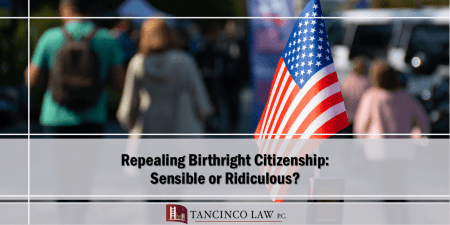
The 14th Amendment to the U.S. Constitution unequivocally states: “All persons born or naturalized in the United States and subject to the jurisdiction thereof, are citizens of the United States and of the State wherein they reside.” For over a century, this constitutional guarantee has conferred citizenship on individuals born within U.S. territory, irrespective of their parents’ immigration status. Despite its clarity, birthright citizenship has recently come under attack, raising critical legal and ethical questions.
Can a Constitutional Amendment Be Repealed by Executive Order?
Today President Donald Trump signed an executive order repealing birthright citizenship. Legally, this claim warrants scrutiny. A constitutional provision cannot be overturned by executive order. To amend the Constitution requires a rigorous process: a two-thirds majority vote in both the House and the Senate, followed by ratification from three-fourths of the states.
Previous attempts to deny citizenship to U.S.-born children of undocumented immigrants through state and federal legislation have consistently been deemed unconstitutional. Even if a Republican-controlled Congress were to pass such a law, it would undoubtedly face significant legal challenges in the courts, given its conflict with established constitutional protections.
A Misguided Approach to Illegal Immigration
Proponents of repealing birthright citizenship argue that it incentivizes illegal immigration. They believe withholding automatic citizenship from the children of undocumented immigrants could serve as a deterrent. Some extremists even frame the issue as a national security concern, suggesting the potential for exploitation by terrorists—an argument that strains credulity.
However, eliminating birthright citizenship is far from a viable solution. In fact, it could exacerbate the challenges posed by illegal immigration. Without birthright citizenship, children born to undocumented immigrants would lack legal status, creating a vulnerable, stateless population. These individuals, unable to fully participate in society, would face heightened risks of exploitation and involvement in criminal activity. Instead of addressing the root causes of illegal immigration, such a policy would compound the problem, leaving both individuals and communities worse off.
The Uphill Legal Battle Against the 14th Amendment
The 14th Amendment serves as a safeguard against arbitrary decisions by politicians about who deserves U.S. citizenship. Its protections extend to everyone born on American soil, ensuring equal treatment under the law. Repealing or undermining this foundational principle would not only provoke significant legal challenges but also carry far-reaching political and social consequences.
President Trump’s proposed repeal would face an uphill battle, requiring a constitutional amendment—an exceedingly rare and complex process. Beyond the procedural hurdles, such an effort would risk eroding the very values of inclusion and equality that underpin the Constitution.
A Counterproductive Proposal
The push to repeal birthright citizenship is not a solution but a diversion. It shifts focus away from addressing the systemic issues driving illegal immigration and instead targets one of the most fundamental principles of American identity. Far from deterring illegal immigration, this proposal would deepen existing challenges, creating a new underclass of individuals without legal recognition.
As a nation, we must carefully weigh the implications of such drastic measures. The debate over birthright citizenship is not just a legal issue but a moral one, reflecting the values we uphold as a society. Rather than dismantling a constitutional cornerstone, the focus should be on comprehensive immigration reform that addresses the root causes of illegal immigration while preserving the rights and dignity of all individuals.
(Atty. Lourdes Tancinco is an immigration attorney and immigrant rights advocate based in the San Francisco Bay area and a partner at the Tancinco Law P.C., law firm established since 1992. She is also a producer/host of Pusong Pinoy sa Amerika, an immigration law informational show aired on GMA Pinoy TV. She may be reached at law@tancinco.com, www.tancinco.com, facebook/tancincolaw, or at 1-888-930-0808)


